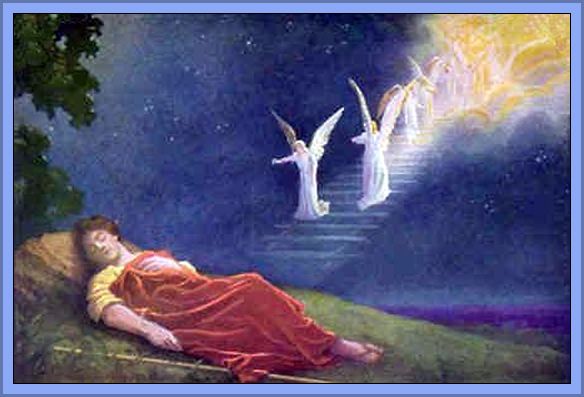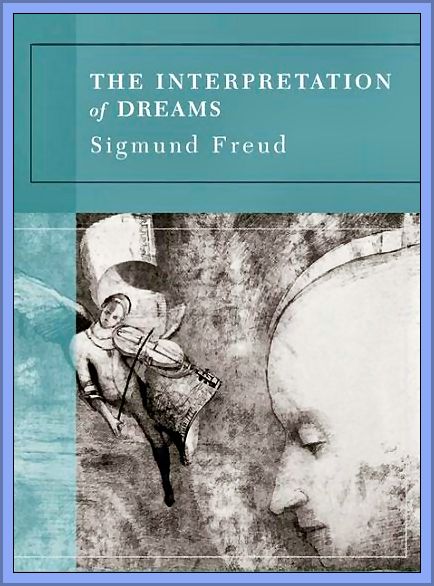 |
| Dream Stealer's Take Your Dreams ..... Or Give You Nightmares. |
So why was that dream so special? .... It wasn't a nightmare and had no bearing on my current life and work, other than perhaps on the fact that I have no partner (a lady featured heavily in the dream plot). It was not terribly realistic, in that I didn't wake up thinking that a real event had occurred, and in fact it had more absurdities than a Dali painting .... but I recalled it fully.
Despite the fact that modern science tells us that all dreaming is, is a method for the brain to clear out clutter, and consolidate memories. Or that some psychologists consider that perhaps dreams allow us to reveal some insight into our hidden desires and emotions, we nearly all still look for some sort of greater personal meaning for our own dreams.
Of course the human race has dreamed since before our ancestors came down from the trees, and in fact other animals very obviously dream so as well. Dogs are especially avid dreamers, and often act out the dreams even as they wake. A well known clip on YouTube, showed a dog dreaming of running, and then crashing into wall on waking, as its legs carried on running. Our relatives, the primates also dream ....
Explanations for why we dream, or about the meaning of dreams have varied and shifted through both time and cultures. For the denizens of Mesopotamia, dreams had some divination uses because many of their clay tablets, when deciphered were recounts of dreams. The earliest of these accounts come from around 3100 BC, and indicate that their scholars, priests, magicians, and even Kings such the 7th century BC ruler Assurbanipal, often recorded their dreams for divination of their gods wishes.
These Sumer Mesopotamians believed (in a fairly logical way), that the soul, or some part of it, moves out from the body of the sleeping person, and actually visits the places and persons the dreamer sees in their sleep ... a belief that has persisted amongst some people right up until today. These ancients usually categorised the dreams as being "good" i.e. those which were sent by the gods. Or "bad" i.e. those sent by demons, and acted upon them accordingly.
The ancient Chinese and Indian cultures also shared the ancient Mesopotamians idea, that dreams were when one of the two vital aspects of the soul leaves, the body of the sleeping person to journey in a dream realm, while the other part remained in the body ... although they also both had other explanations as well.
Similarly the Egyptians thought that the best way to receive divine revelations was through their dreams, and they would induce (or "incubate") dreams, often in special sanctuaries with "dream beds", in the hope of receiving advice, comfort, or healing from the gods. The Jews discussed dreams in the 'Talmud', and considered them to be a part of the human experience of the world that can be interpreted, and from which instruction can be learnt. They also practised the idea incubated dreams in order to receive divine revelation, via sleeping before the ark of the covenant in the temple (in Jerusalem).
Our western forbearer's such as the Greeks and Romans, considered that some dreams were direct messages from deities of one form or another, or from deceased people and ancestors, and that if deciphered correctly they warned of or predicted the future. The Greeks also practised dream incubation via sleeping in gods shrines and temples.
In both cultures, later thinkers expressed ideas that explored other explanations of dreams ... Hippocrates (yes he of 'Hippocratic oath' fame), had a simple dream theory: that during the day, the soul receives images; during the night, it produces images. While the greatest of the Greek philosophers, Aristotle, believed that dreams caused physiological activity (much like dogs dreaming). He thought dreams could also be used to analyse illness and predict diseases .... while the Roman writer Cicero believed that all dreams are produced by thoughts and conversations a dreamer had during the preceding days.
 |
| Early Christians Believed In Messages From God Via Dreams. |
The early Christian world shared their beliefs with the Jews, but often with a smattering of the ideas of the Greeks and Romans on the matter ... but later, in the Middle Ages there was a Western Christian Protestant revision in this interpretation of dreams, which were now seen as evil, and the images, merely as temptations from the devil (removing the good god aspect but retaining the bad devil aspect of the Sumerian beliefs). Many of these Christians e.g. Martin Luther, believed that during sleep, it was only the devil who could fill the human mind with corrupting and harmful thoughts. Shamanistic cultures on the other hand, such as the pre Roman Celts, Native Americans of North and South America, or Siberia tribes, have often considered dreams as simply a way to meet the ancestors.
In fact as discussed above, there were common motifs across nearly all the ancient cultures (regardless of contact or not). These can be summarised loosely as:
- The existence of dream worlds which part of our soul visits.
- Incubation of Dreams is desirable and can be performed via rituals or special locations.
- Revelation or Messages from God, the Gods, or Ancestors are via the drema world or dream state.
 |
| Freud - Following In The Footsteps Of Giants .... |
But there has always been an alternative 'logical' narrative for dreams, which as Aristotle proposed, was that dreams could also be used to analyse for illness, and predict diseases, or as Cicero believed, which was that all dreams are produced by thoughts and conversations a dreamer had during the preceding days or years.
This all leading to theories by our modern day shamans, psychologists, who lead by Freud and Jung had their own theories .... Freud for example wrote extensively about dream theory, believing them to be manifestations of our deepest desires and anxieties (often from childhood), and in 'The Interpretation of Dreams' in 1899, he developed a psychological technique to interpret dreams and devised a series of guidelines to understand the symbols and motifs that appear in our dreams. Which is not so different from dream catchers or the ancient idea of dreams as being either "good" or "bad".
When you look at it, we haven't come much further in our understanding of dreams, in the thousands of years since Aristotle first thought on the subject.
We are such stuff as dreams are made on ...

Excellent summary.
ReplyDeleteIt's been a long time since I've had a dream in which I was aware that I was dreaming. Perhaps unsurprisingly, they don't last very long.
There are people who can steer their dreams and its only happened to me once or twice.
DeleteSpeaking of steering dreams, I had one where I had a car steering wheel stuck down my trousers, it drove me nuts!
DeleteHa ha! What is dreaming?
DeleteDreaming is an act of pure imagination, attesting in all men a creative power, which if it were available in waking, would make every man a Dante or Shakespeare
Thanks for the both for the comments. Ha ha Vroomfondel. Nice tie in with the Shakespeare and Dante post BAWDY
Delete